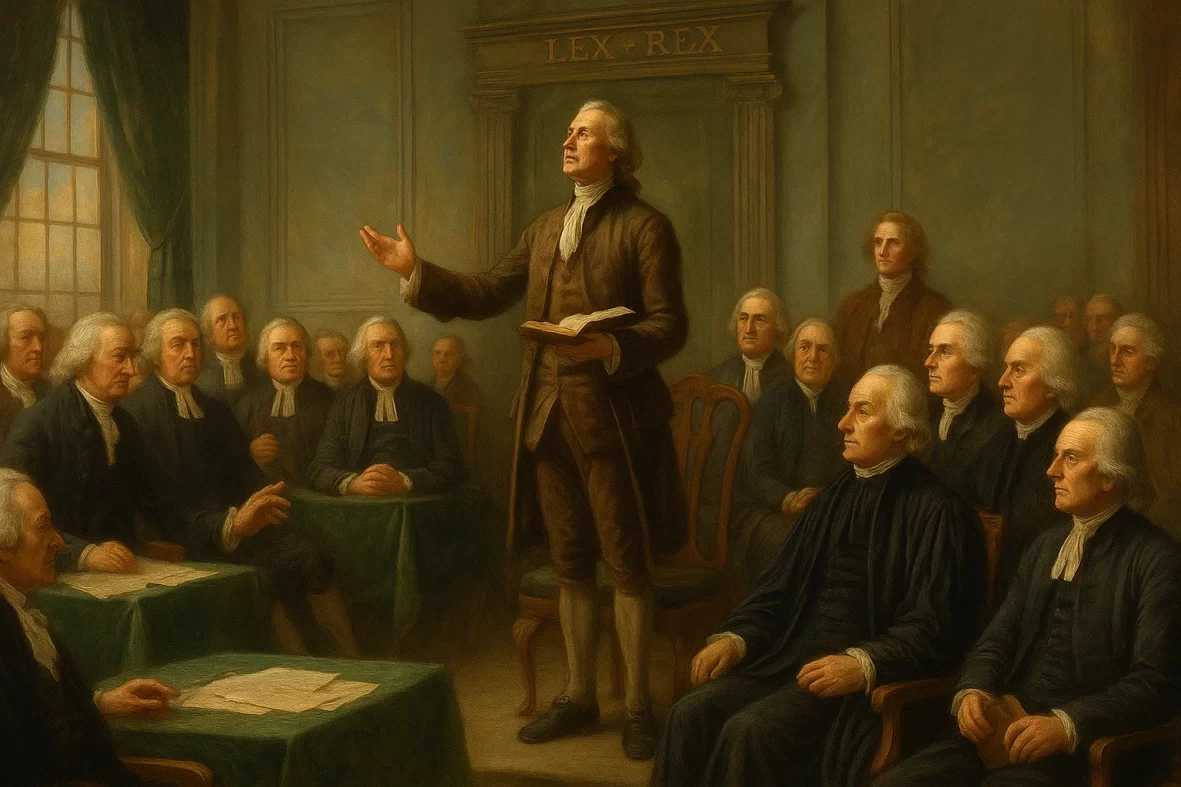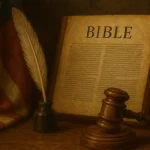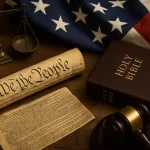Part 5 of the series: Faith and the Founding: A Theological Engagement with America’s Origins
The King on Trial: A Revolution in Authority
On a frigid January day in 1649, the unthinkable happened: a reigning king of England was put on trial by his own subjects. King Charles I, accused of tyranny and treason, stood before a tribunal in Westminster Hall as a court of commoners questioned his actions . He refused to acknowledge the court’s legitimacy, for in his mind rex lex—the king is law—had always been the governing principle . Yet in that moment, the ancient notion of absolute monarchy was dramatically challenged. A king was being held accountable to a law above himself, a notion with deep Christian and legal roots. Days later, Charles was found guilty and executed, a tragic yet pivotal episode in the English Civil War. The spectacle of a monarch facing judgment under law sent shockwaves through Europe. It signaled that even the sovereign was not beyond Lex Rex—“the law is king.” This historical drama, born of political turmoil and religious conviction, set the stage for a new understanding: no ruler, however exalted, is above the transcendent law of God and the just laws of man .
This stunning event did not arise in a vacuum. For decades, English and Scottish reformers had questioned the “divine right” of kings who placed themselves above all earthly constraint. In the previous century, faithful leaders had begun to insist that kings must submit to God’s higher law or else forfeit their legitimacy. By the 1640s, a Scottish Presbyterian theologian named Samuel Rutherford crystallized these ideas in a book whose Latin title itself was a bold provocation: Lex, Rex, meaning “the Law is King.” Rutherford’s treatise—written amid civil war—directly rebutted the royalist creed of rex lex (“the king is law”), which had long undergirded absolute monarchies. In Lex, Rex (1644) Rutherford argued that the rule of law stands above the whims of any ruler . No king, Rutherford contended, has unconditional or godlike authority; rather, a ruler’s power is a fiduciary trust from the people under God’s supreme law . This idea was so threatening to the old order that after the monarchy was restored, Lex, Rex was banned and publicly burned . Nevertheless, the genie was out of the bottle: a king had been tried and a theologian had declared the law above the king. The stage was set for profound political and theological shifts in the English-speaking world.
Lex Rex vs. Rex Lex: “The Law is King” Defined
To appreciate the significance of Lex, Rex, we must understand the contrast it draws. In Latin, rex lex means “the king is law,” expressing the old idea that a monarch’s word is the ultimate authority. For centuries, many believed that kings were accountable only to God, not to any human law; their personal will could make or break law at a whim . Under this view, royal power was absolute—justice flowed from the throne, and the king himself was above all legal restraint. By stark contrast, lex rex asserts “the law is king.” This revolutionary concept flips the medieval hierarchy: the law, rooted in divine justice and natural rights, reigns supreme over governors and governed alike. Rutherford’s Lex, Rex systematically argued that no one—not even a king—is above God’s law or the fundamental laws of the realm . As Rutherford put it, rulers are under a legal and moral covenant: if a king violates the law or becomes a tyrant, the people (and lesser magistrates) may lawfully resist or remove him . Government, in this paradigm, is not the personal property of princes but a contract under God’s authority for the good of the people. In essence, Lex, Rex taught that “the king is under the Law, and the Law above the king”, a direct rebuttal to royal absolutism (Rutherford, 1644/1982). This ideal of the rule of law – that the law, reflecting transcendent moral order, should govern even kings – became a cornerstone of later constitutional thought . It is a principle enshrined today wherever we say we have “a government of laws and not of men.”
Importantly, Rutherford did not invent the idea of a higher law so much as articulate a Christian political vision that had been developing for centuries. Lex, Rex stands in a long tradition of biblical and natural law thinking. Rutherford drew on Scripture, classical authors, and scholastic theologians to show that the king isn’t above the law . For example, the Bible itself contains seeds of lex rex: the kings of ancient Israel were commanded to write for themselves a copy of God’s law, to read it and obey it “that his heart may not be lifted up above his brothers” (Deuteronomy 17:18–20). In other words, even in the Old Testament, the king had a duty to submit to the Law of the Lord and could not rightly place himself above it. Likewise, the prophets repeatedly confronted wayward kings, reminding them that justice and righteousness—not royal prerogative—were the standards by which God judged rulers. Rutherford’s contribution was to apply these biblical insights, alongside Reformation theology, to the politics of his day. He echoed earlier Protestant resistance writers like Theodore Beza and the anonymous authors of Vindiciae Contra Tyrannos (1579), who argued that when a king violates God’s law or the fundamental rights of the people, he breaks the social covenant and can be resisted . Rutherford carried these ideas further, maintaining that the people collectively (under God) are superior to the king and entrust him with authority conditionally . If that trust is abused – if a ruler becomes a “tyrant… and no lawful king” by opposing justice – then he has violated the law above him . Such arguments were radical for the 17th century: Lex, Rex was effectively the most comprehensive Reformed case for constitutionalism and limited government in a time of absolute kings . It grounded the rule of law in a higher moral law, ultimately in the will of God and the consent of the governed, rather than in the personal will of monarchs . This was a seed that would bear fruit in later revolutions and constitutions.
Reformation Roots of a Higher Law
Why did these ideas take root in the 1600s? The answer lies in the fertile soil of the Protestant Reformation, which had rediscovered the authority of Scripture and the concept of covenant. The Reformation taught that all human authorities—popes, kings, or councils—must yield to the supreme authority of God’s Word. This had political implications: if even church leaders were fallible under Scripture, so too were monarchs. Reformers like Martin Luther and John Calvinurged obedience to civil authority (citing Romans 13), but they also denied that kings were autonomous gods on earth. Calvin, for instance, acknowledged that lower magistrates have a duty to restrain a tyrannical higher magistrate, an early form of checks and balances. In 1550, Lutheran leaders in Magdeburg famously wrote that when a ruler attacks God’s law and oppresses the innocent, lesser authorities have not only a right but a responsibility to resist in defense of the public (the Magdeburg Confession, 1550). The Huguenot authors of Vindiciae Contra Tyrannos built on this, asserting that kings are party to a double covenant: with God and with the people . If the king violates God’s law or the people’s fundamental rights, he effectively abdicates his legitimacy, and resistance is justified . This was a revolutionary idea in an age when questioning the king’s authority could be a capital offense. Yet it was rooted in biblical examples: the Hebrew Scriptures recount instances of God disciplining or removing kings (Saul, Nebuchadnezzar) when they became proud or tyrannical. The idea of a transcendent moral law above kings was woven into the Judeo-Christian worldview.
Samuel Rutherford, as a Scottish Presbyterian, inherited these ideas through the Scottish Reformation and the covenanting tradition. The Scots had long emphasized Christ’s kingship over the church and nation. Rutherford’s Lex, Rex quotes liberally from Scripture, finding in the Bible a model for lawful government. For instance, Rutherford highlighted the “Mosaic pattern” of governance in the Old Testament to argue for a form of republican or anti-monarchical polity . The Israelites, though eventually having kings, were initially governed by judges under God’s law – a theocratic republic of sorts, where God’s law was supreme and no single man held unlimited power. Even when Israel got a king, that king was required to obey the covenant law (Deut. 17 again) and prophets would hold him to account. Rutherford and his Reformed contemporaries saw these as prototypes: government should be based on mutual covenant, rule of law, and accountability under God. In Lex, Rex, Rutherford wrote “the prince is under the law and subservient to the ends of the state”, describing rulers as ministers of God for the people’s good, not masters of the people for their own good . Civil authorities were to be “nursing fathers” (a biblical phrase from Isaiah 49:23), duty-bound to uphold justice and the true religion. These Reformation ideas radically challenged the old Rex Lex model. Instead of an unchecked pyramid of power descending from a king, the Reformers envisioned a more balanced structure: rulers under law, power conditioned on justice, and the people possessing a God-given dignity that even kings must respect . It was a vision in which Lex (law) had rightful authority over Rex (the king) because Lex ultimately represented the just character of God and the natural rights He bestowed on humanity.
This Reformation legacy decisively influenced later political developments. Historians of the American founding note that many colonial leaders were steeped in Reformed political theory . The notion that government rests on a social covenant and that rulers are accountable to higher laws traveled across the Atlantic through sermons, pamphlets, and the education of clergymen. As scholar Mark David Hall observes, America’s Founders “drew predominantly on the Reformation’s social covenant model” of politics, rather than on a purely secular social contract theory divorced from faith . In other words, long before the Enlightenment philosophies of Locke or Montesquieu took hold, the cultural DNA of the colonies already contained these Protestant ideas: that there is a God above kings, a law above edicts, and a people endowed with rights that no government can nullify. By the 18th century, even as Enlightenment thought also made its mark, the biblical-Reformation concept of the rule of law had prepared many in America to resist any ruler—be it Parliament or King George III—who behaved like a law unto himself. As one colonial pastor, Jonathan Mayhew, famously preached in 1750: “Disobedience to tyrants is obedience to God.” Such rhetoric flowed from the Lex Rex principle and set the stage for the American Revolution.
The American Founders and the Rule of Law
It is often noted that the American Revolution (1776) was not anarchy against all authority, but a call for legitimateauthority based on the rule of law. The Declaration of Independence itself appealed to a “Law of Nature and of Nature’s God” above King George, indicting the British monarch for violating fundamental laws and rights. The Founders believed they were upholding, not overthrowing, the rule of law by rebelling against a law-breaking king. Indeed, many had imbibed Rutherford’s ideas (directly or indirectly) through their education and religious upbringing . A number of influential founders were trained at Presbyterian colleges or by ministers who treasured Lex, Rex. Historians have observed that Rutherford’s outline of constitutionalism and limited government was “especially attractive to many American Founders”, who saw George III acting “akin to [a tyrant like] Charles I” and thus felt justified in resisting him . The American founding generation carried forward the banner of lex rex by building a nation “of laws and not of men.”
Scene at the signing of the U.S. Constitution, 1787. The Founders designed a government of separated powers—each constrained by law—to ensure no ruler or faction could reign above the law.
After winning independence, the Americans deliberately enshrined the rule of law in their new institutions. By the late 1780s, they drafted constitutions—first at the state level and then the federal Constitution of 1787—that put into practice the ideals of limited government and legal supremacy. As one scholar notes, the late 18th century was an era when modern constitutionalism “with its emphasis on limited government and liberty under the rule of law” took decisive form . The U.S. Constitution begins with the words “We the People” as the source of governing authority, and it establishes a framework where the law (the Constitution itself) is supreme over elected officials. Under Article VI, even the President is bound by oath to uphold the Constitution. This was lex rex in action: the law created the offices of government and defined their powers, rather than the other way around. The founders instituted separation of powers – dividing authority between legislative, executive, and judicial branches – to prevent the concentration of power that had enabled kings to become tyrants . Each branch was given lawful powers but also lawful limits, checking and balancing the others. The concept of higher law was also evident in the inclusion of bills of rights in American constitutions, which placed certain fundamental principles (like due process, trial by jury, protection of life, liberty, and property) beyond the reach of ordinary politics. Even a popular majority could not easily violate those rights without amending the higher law of the Constitution itself. The rule of law meant that no person, not even a president or a congressman, could lawfully do whatever they pleased; they were constrained by written law and the watchful mechanisms of accountability (elections, impeachment, judicial review).
This commitment to rule of law was heavily influenced by both Enlightenment insights and biblical convictions. The founders were realists about human nature. James Madison famously wrote in The Federalist No. 51 that “If men were angels, no government would be necessary.” The flip side of that insight is that because humans are fallible (a view informed by the Christian doctrine of original sin), those who govern must be both empowered and restrained by law. The founders knew from history that unchecked power led to abuse; thus, they embedded legal limits and accountability structures at every level of government. For example, the president is bound to execute the laws, judges are bound to the Constitution, and legislators are bound by both public opinion and constitutional bounds. John Adams captured the essence when he described the ideal American system as “a government of laws, and not of men.” In the Massachusetts Constitution of 1780 (largely drafted by Adams), Article XXX declared that the government should be set up “to the end it may be a government of laws and not of men.” This phrase echoed the lex rex principle: laws, not individual rulers’ wills, are to govern. The founders inherited this ideal in part from their English ancestors (the Magna Carta tradition and British common law) and in part from their Judeo-Christian heritage.
Significantly, modern research confirms that the Bible was a formative influence on the founders’ political ethos. Political scientist Donald Lutz conducted an extensive study of American political writings from 1760 to 1805 and found that the Bible was the most frequently cited source in that discourse . Astonishingly, approximately one-third of all citations in founding-era literature were from the Bible—far more than from any single Enlightenment writer . The Book of Deuteronomy (which reiterates God’s law) was the most quoted work of all, cited nearly twice as often as John Locke’s writings . This doesn’t mean the founders set out to create a theocracy (they explicitly did not), but it does show that biblical concepts of law, justice, and authority permeated their thinking. Even the “secular” authors the founders loved—Montesquieu, Blackstone, Locke—were themselves deeply influenced by Christian natural law ideas . As Lutz observes, when reading broadly in the literature of the Revolution, “one cannot but be struck by the extent to which biblical sources used by ministers and Whigs undergirded the justification for the break with Britain and the basic principles of Americans’ writing their own constitutions” . In other words, lex rex was often preached from colonial pulpits. Sermons spoke of the Hebrew Republic under Moses, the covenantal kingdom of Israel, and the justice of God, drawing analogies to the American situation . Ellis Sandoz, a scholar of the founding, notes that the American experiment was built on both secular reason and “the biblical faith” of the people . The result was a constitutional order that affirmed transcendent moral principles (natural rights, God-given equality, justice for all) as the foundation for positive law.
The U.S. Constitution thus can be seen as a practical outworking of lex rex. It established a supreme law (the Constitution itself) that even the rulers must obey. It carefully limited executive power—America would have no king, only an elected president subject to re-election and removable by impeachment for unlawful behavior. It created an independent judiciary to apply the law impartially even against the government if needed. And it made the legislature rather than a single ruler the source of most laws, reflecting the idea that law derives from the people (under God) rather than from one man’s will. In short, the Founders put into place mechanisms to ensure nobody in America could say “I am the law.” Instead, they all had to say “the law is above me.” This is the very essence of the rule of law.
Biblical Foundations: Justice, Impartiality, and the Image of God
What gave the founders such confidence in the rule of law? Partly their historical experience and Enlightenment rationality, but also their biblical worldview. Several key biblical principles provided a foundation for the rule of law in Western thought:
- Imago Dei – Human Dignity and Equality: The Bible teaches that all humans are created in the image of God (Genesis 1:27). This implies a fundamental equality of worth. No king, no matter how lofty, bears more of God’s image than a peasant. This Christian idea revolutionized politics by undermining castes and absolute hierarchies. If all people are equal before God, then all should be equal before the law as well . The American Founders echoed this when they wrote “all men are created equal… endowed by their Creator with certain unalienable Rights” (Declaration of Independence). That statement reflects both Enlightenment and biblical influence. As one modern writer notes, “according to the Christian worldview, no king was above God’s law, and every individual had God-assigned personal rights”, flowing from each person’s creation in God’s image . Thus, the rule of law protects human dignity by affirming that no one’s life or liberty is subject to another’s mere whim. Everyone, from the richest to the poorest, must be treated as a person of equal worth under the law.
- Justice and Righteousness: The Scriptures strongly emphasize that rulers must administer justice fairly. “Justice, and only justice, you shall follow” says Deuteronomy 16:20. Kings are exhorted in Psalm 72 to defend the cause of the poor and crush the oppressor. The prophet Micah sums up God’s requirement for all people: “to do justice, love mercy, and walk humbly with your God” (Micah 6:8). These themes taught Christian thinkers that the legitimacy of any government rests on its commitment to justice. Unjust laws – laws that violate basic moral truth or oppress the innocent – were understood as no laws at all in the ultimate sense (as theologians like Augustine and Aquinas argued). The founders shared this perspective. They spoke of “unalienable rights” and “self-evident truths” – implying that there is a higher standard of right and wrong against which any man-made law can be judged. The rule of law in the American tradition was never meant to be mere proceduralism; it was about just law. This conviction again links to lex rex: the king (or legislature) cannot just decree whatever it wants, because true law is rooted in transcendent justice, not in human caprice. As John Adams wrote in 1776, a republic is “an empire of laws” because laws, to be valid, must align with reason and justice (which for Adams were grounded in the nature God gave us) . For Christians, God’s character is the ultimate measure of justice, so any ruler’s edict that egregiously violates justice is considered illegitimate (hence the American argument that King George’s violations of colonists’ rights broke the colonial charters and English constitutional law).
- Impartiality and the Rule of Law: The Bible repeatedly insists that judges and rulers “show no partiality” and “take no bribe” (Deuteronomy 16:19, 2 Chronicles 19:7). In God’s eyes, there is no respect of persons (Acts 10:34, James 2:1). This biblical ethic of impartiality directly supports the rule of law, because the law is supposed to apply equally to all. Under rex lex (the king above law), partiality was inherent – the king and his favorites lived by one standard, everyone else by another. But the biblical ideal holds that the same law should govern the great and the small: “You shall not pervert justice by favoring either the poor or the rich; judge your neighbor righteously”(Leviticus 19:15 paraphrase). The founders tried to embody this by prohibiting titles of nobility and by writing constitutions that bound themselves as much as their citizens. A striking example: when George Washingtonpresided over the Constitutional Convention, he, a potential first president, agreed that the president could be impeached and removed for misconduct – a provision that made even the chief executive subject to the law. This was a living out of impartial justice. In practice, of course, America has at times failed to live up to equal justice (e.g. in slavery and segregation), but the ideal standard to which reformers appealed was the Judeo-Christian principle of impartial law. The Civil Rights Movement of the 1950s–60s, for instance, explicitly cited America’s founding creed and biblical themes to demand that the nation enforce the rule of law equally for black Americans as for white.
- The Restraint of Sin: Christian theology teaches that humans are sinful and prone to abuse power. “There is none righteous, no not one” (Romans 3:10). The reformer John Calvin famously said that rulers needed checks and accountability because they are fallen humans like the rest of us. This did not lead to cynicism about government, but to prudence in structuring government. The founders’ design of separated powers and checks and balances aligns perfectly with this Christian realism. As noted, they believed people are not angels, so concentrating power is dangerous. The rule of law serves as a restraint on our sinful tendencies: it creates external standards and processes that channel and limit the exercise of power. For example, an official might want to punish a personal enemy, but the law forbids punishment without due process and evidence – thereby restraining vindictiveness. In Federalist No. 51, Madison put it: “Ambition must be made to counteract ambition.” That is practically a paraphrase of the biblical insight that since human hearts are inclined to selfishness, we need structures that pit self-interest against itself for the common good. By spreading authority across many offices and rooting all in a firm legal framework, the American founders endeavored to restrain the worst impulses of human nature. In theological terms, one might say the rule of law acts as a common grace – a gift of God to fallen humanity to help curb the excesses of sin and promote peace (cf. Romans 13:1-4, where governing lawfully is said to be God’s servant for good, restraining wrongdoers).
These biblical principles—human dignity, justice, impartiality, and realism about sin—together bolster the case for the rule of law. They answer both why we should have the rule of law (because it honors human worth and God’s standard of justice) and how we should implement it (impartially and with wise constraints). It’s little wonder that early American leaders, nearly all influenced by Christian moral thought, believed that their new republic’s success depended on the virtue of her people and the justness of her laws. As Daniel Dreisbach notes, many founders saw in the Bible not just personal inspiration but “political and legal models” for concepts like republicanism, separation of powers, and due process . They were convinced that a stable, free society had to reflect the moral order ordained by the Creator.
Why Christians Should Care About the Rule of Law Today
In our contemporary world, talk of the “rule of law” might sound abstract or bureaucratic. But for Christians, it should be a cherished principle—one with profound spiritual and practical significance. Here are a few reasons why the rule of law still matters for faithful civic engagement today:
1. Protecting Human Dignity: Because every person is made in God’s image, every person deserves equal treatment and protection under the law. The rule of law guards the weak from being trampled by the strong. It says that no one, not even the rich, powerful, or government itself, can arbitrarily strip away the life or liberty of another made in God’s likeness. In societies without rule of law, those in power often oppress minorities and dissenters with impunity. But where law reigns, the humble can appeal to a standard higher than an official’s whim. This reflects the biblical concern for the vulnerable – the widow, orphan, stranger – whom the prophets insist be protected by just laws. When Christians support the rule of law, we are standing for the God-given worth of each person, ensuring that justice doesn’t depend on your status or connections. It is a way of “loving our neighbor as ourselves” (Matthew 22:39) in the public square.
2. Restraining Evil and Sin: The rule of law is a bulwark against the chaos of human sin. We know from Scripture and history that unchecked human power leads to corruption (Mark 7:21-23). A system of laws and accountable governance helps restrain those corrupt impulses. This is one reason Paul in Romans 13 praises governing authorities as serving God’s purpose by punishing wrongdoers – effectively, by enforcing laws. Christians, with our doctrine of sin, should not be utopian about human nature; we shouldn’t assume “it can’t happen here” when it comes to tyranny or lawlessness. Instead, we proactively uphold legal structures that channel authority responsibly. By supporting things like an independent judiciary, honest law enforcement, and constitutional limits, believers become “peacemakers” in society (Matthew 5:9), helping prevent the floods of lawlessness that bring misery. In times when society seems to glorify doing what is right in one’s own eyes (Judges 21:25), a commitment to the rule of law is a reminder that truth and justice are not merely subjective. It is a commitment to the idea that some things are inherently right or wrong and that agreed-upon laws should consistently uphold that moral order.
3. Reflecting God’s Justice and Character: The Bible reveals God as a God of order, justice, and faithfulness. “All His ways are justice,” says Deuteronomy 32:4. When human societies uphold the rule of law, they imperfectly mirror God’s just rule. We acknowledge that law – when consistent with true justice – is good, and chaos or tyranny is evil. The rule of law also reflects God’s impartiality – He “shows no partiality” (Acts 10:34), and a righteous legal system strives to do the same. Furthermore, living under law resonates with the biblical concept of covenant: God governs His people through covenants (which include laws and promises), not arbitrary diktats. When our civic life is ordered by covenants (constitutions, charters) and laws rather than personal decree, we are echoing that covenantal structure. In a way, insisting on the rule of law can be an act of worship: it proclaims that there is a moral order above us to which we all are accountable. For Christians, it affirms that Jesus is Lord – not any human ruler – and that even political leaders must ultimately answer to Him (Psalm 2). Supporting the rule of law, then, is part of seeking God’s kingdom and righteousness in our society (Matthew 6:33). It means advocating for laws and leaders that approximate God’s standards of justice, knowing full well we won’t achieve perfection but still striving for a more just order.
4. Preserving Freedom for Gospel Ministry: Practically speaking, the rule of law provides the stable environment in which the church can “lead a peaceful and quiet life, godly and dignified in every way” (1 Timothy 2:2). When government operates by settled laws, Christians can evangelize, worship, and serve their communities without fear of sudden persecution or violence. One of the grievances in the Declaration of Independence was that the king had made judges “dependent on his Will alone” – a collapse of rule of law that the founders knew would threaten every liberty, including religious liberty. Where the rule of law is strong, basic freedoms like speech and worship tend to be secure. Where it fails, those freedoms are often the first to vanish. Thus, in seeking the peace and welfare of our nation (Jeremiah 29:7), we have good reason to promote rule of law reforms – from fair courts to transparent governance – as part of our Christian stewardship. It helps create a society where we can freely live out and share our faith.
5. Accountability and Humility: Finally, the rule of law inculcates a spirit of humility in leaders. It reminds those in authority that they are not ultimate. For Christian officials, this dovetails with their understanding that they are servants of God and the people (Romans 13:4). But even for non-Christian officials, being under law can act as a tutor in humility and virtue. Christians should encourage this. We do no favors to our leaders by treating them as messiahs or above criticism. It is far better – and more biblical – that we expect our leaders to follow the law. Think of King David in the Old Testament: when he sinned by abusing his royal power, the prophet Nathan held him to account (2 Samuel 12), effectively appealing to God’s higher law over the king. David’s greatness lay in his repentance and submission to God’s judgment. In our day, we likewise honor leaders not by exempting them from rules, but by holding them accountable to the law. In doing so, we encourage a culture of righteousness and truth.
In sum, Christians have both principled and practical reasons to champion the rule of law. It is not an idol (we don’t put our ultimate trust in human law over God), but it is a gift from God for the ordering of society. At its best, the rule of law is a reflection of God’s own just governance. It ensures that power is tamed and directed to the common good, that the rights given by God are safeguarded, and that evil faces restraint. In a world marred by human sinfulness, a society under the rule of law is like “salt” and “light” (Matthew 5:13–14), preserving what is good and illuminating dark corners of injustice.
Conclusion: Lex Rex for Today
The story of Lex, Rex and the rule of law is ultimately a testament to a biblical insight: there is a law above our laws, a Divine standard of justice and righteousness to which all human authority is answerable. Samuel Rutherford’s 1644 treatise sparked a flame by declaring that even kings must bow to the principles of justice and godliness. That flame helped light the path for constitutional governments like America’s, where written laws and checks on power protect the God-given rights of the people. History shows that when nations uphold the rule of law, people “rejoice” (cf. Proverbs 29:2); when they abandon it, people groan. Today, thoughtful Christians should engage in civic life with a dual awareness: we are citizens of heaven and earth. As citizens of heaven, we know that no earthly system will ever be perfect until Christ’s return. Yet as citizens of earthly communities, we are called to seek justice and the common good (Isaiah 1:17, Jeremiah 29:7). Supporting the rule of law is one vital way we do that. It is a way of ensuring that government serves its God-ordained purpose of rewarding good and restraining evil (1 Peter 2:14).
In our conversations and activism, we can promote policies that strengthen the rule of law – whether that means fighting corruption, ensuring equal justice in the criminal system, or defending the integrity of constitutional processes. We do this not out of a naive faith in law itself, but out of faith in the God who established moral law. We hold our leaders accountable not because we reject authority, but because we honor the higher authority of Christ, the King of kings. In a sense, “Lex Rex” for the Christian is ultimately “Christus Rex” – Christ is King, and His righteous law is above all. By championing the rule of law, we bear witness to this truth in the public realm. We declare that no human is god, that justice is real, and that freedom must be guarded by truth.
The warm hope of the gospel is that one day, all injustice will be judged and perfect justice will roll down “like waters” (Amos 5:24) under the reign of Christ. Until that day, our task is to labor for a just society here and now, however imperfect. Embracing the rule of law is a practical and profound way to love our neighbors, protect the vulnerable, and reflect the character of our righteous God in our civic life. In the legacy of Lex, Rex, let us affirm that Law—rooted in God’s law—is king. And let us live and lead in a way that honors the Law above kings, to the glory of the King above all laws.
References
Hall, M. D. (2011). Did America have a Christian founding? The Heritage Foundation. (Lecture, June 7, 2011)
Hyneman, C. S., & Lutz, D. S. (Eds.). (1983). American Political Writing During the Founding Era: 1760–1805 (Vols. 1–2). Indianapolis, IN: Liberty Fund.
Lutz, D. S. (1988). The Origins of American Constitutionalism. Baton Rouge, LA: Louisiana State University Press .
Rutherford, S. (1644/1982). Lex, Rex, or The Law and the Prince. (Reprint, Harrisonburg, VA: Sprinkle Publications).
Sandoz, E. (1990). A Government of Laws: Political Theory, Religion, and the American Founding. Baton Rouge, LA: Louisiana State University Press.
Dreisbach, D. L. (2017). Reading the Bible with the Founding Fathers. New York, NY: Oxford University Press .
Sandoz, E. (Ed.). (1998). Political Sermons of the American Founding Era: 1730–1805 (2nd ed.). Indianapolis, IN: Liberty Fund.
Hall, D. W. (1997, April 26). The Reformation Roots of Social Contract. Paper presented at the Philadelphia Society Meeting .
Hall, M. D. (2019). Did America Have a Christian Founding? Nashville, TN: Thomas Nelson.
Dreisbach, D. L. (2011). The Bible in the political rhetoric of the American Founding. Politics and Religion, 4(2), 401–427 .








